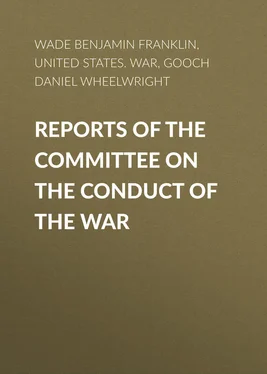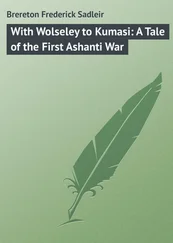Benjamin Wade - Reports of the Committee on the Conduct of the War
Здесь есть возможность читать онлайн «Benjamin Wade - Reports of the Committee on the Conduct of the War» — ознакомительный отрывок электронной книги совершенно бесплатно, а после прочтения отрывка купить полную версию. В некоторых случаях можно слушать аудио, скачать через торрент в формате fb2 и присутствует краткое содержание. Жанр: История, foreign_antique, foreign_prose, на английском языке. Описание произведения, (предисловие) а так же отзывы посетителей доступны на портале библиотеки ЛибКат.
- Название:Reports of the Committee on the Conduct of the War
- Автор:
- Жанр:
- Год:неизвестен
- ISBN:нет данных
- Рейтинг книги:3 / 5. Голосов: 1
-
Избранное:Добавить в избранное
- Отзывы:
-
Ваша оценка:
- 60
- 1
- 2
- 3
- 4
- 5
Reports of the Committee on the Conduct of the War: краткое содержание, описание и аннотация
Предлагаем к чтению аннотацию, описание, краткое содержание или предисловие (зависит от того, что написал сам автор книги «Reports of the Committee on the Conduct of the War»). Если вы не нашли необходимую информацию о книге — напишите в комментариях, мы постараемся отыскать её.
Reports of the Committee on the Conduct of the War — читать онлайн ознакомительный отрывок
Ниже представлен текст книги, разбитый по страницам. Система сохранения места последней прочитанной страницы, позволяет с удобством читать онлайн бесплатно книгу «Reports of the Committee on the Conduct of the War», без необходимости каждый раз заново искать на чём Вы остановились. Поставьте закладку, и сможете в любой момент перейти на страницу, на которой закончили чтение.
Интервал:
Закладка:
Question. What became of the enemy after the repulse?
Answer. They went south, and on the 26th I was notified by Colonel Hicks and by Colonel Lawrence that they were approaching Columbus.
Question. What was done?
Answer. I went to Columbus again, with such men as could be withdrawn from Cairo, and awaited an attack, but none was made. We were too strong, of which rebels in our midst had probably advised them.
Question. Do you permit rebels to remain within your lines?
Answer. Of course; after they have taken the oath.
Question. What is done in case they violate, by acting as spies, for instance?
Answer. I don't like to acknowledge that we swear them over again, but that is about what it amounts to.
Question. What became of your garrison at Hickman?
Answer. It was but 14 miles from Union City; too weak for defence, and unimportant. Having no re-enforcements to spare, I brought away the garrison.
Question. Was Union City important as a military post?
Answer. I think not, except to keep the peace and drive out guerillas. The railroad was operated to that point at the expense of the government, being used in carrying out supplies, which went mostly into disloyal hands, or were seized by Forrest. The road from Paducah to Mayfield was used by its owners. Enormous quantities of supplies needed by the rebel army were carried to Mayfield and other convenient points, and passed into the hands of the rebel army. I found this abuse so flagrant and dangerous that I made a stringent order stopping all trade. I furnish a copy herewith, making it part of my answer, (Exhibit A.)
Question. What, in your opinion, is the effect of free trade in western Kentucky and Tennessee?
Answer. Pernicious beyond measure; corrupting those in the public service, and furnishing needed supplies to enemies. I am in possession of intercepted correspondence, showing that while the trader who has taken the oath and does business at Paducah gets permits to send out supplies, several wagons at a time, his partner is receiving them within the rebel lines under permits issued by Forrest. A public officer is now under arrest and held for trial for covering up smuggling of contraband goods under permits, and sharing the profits. Pretended loyal men and open enemies thus combined, and the rebel army gets the benefit. We are supplying our enemies with the means of resistance.
Question. Could not the rebels have been sooner driven out of your neighborhood?
Answer. They could by withdrawing men from duties which are presumed to be of greater importance. That point was settled by my superior officers. Forrest's force was near Mayfield, about equidistant from Paducah, Cairo, and Columbus, only a few hours from either. He was at the centre, I going round the edge of a circle. I could only watch the coming blow and help each weak point in turn. One evening, for instance, I sent 400 men to Columbus, expecting trouble there, and the next morning had them at Paducah, 75 miles distant.
Question. Had you instructions as to the presence of that force so near you?
Answer. Not specific. General Sherman, on the 23d of March, telegraphed that he was willing that Forrest should remain in that neighborhood if the people did not manifest friendship, and on April 13 he expressed a desire that Forrest should prolong his visit until certain measures could be accomplished. I think General Sherman did not purpose to withdraw a heavy force to pursue Forrest, having better use for them elsewhere, and feeling that we had force enough to hold the important points on the river. It may be that the strength of the enemy and the scattered condition of our small detachments was not fully understood. We ran too great a risk at Paducah. Nothing but great gallantry and fortitude saved it from the fate of Fort Pillow.
Question. What information had you of the attack of Fort Pillow?
Answer. Fort Pillow is 170 miles below here, not in my district, but Memphis. On April 13, at 6 p. m., I telegraphed General Sherman as follows:
"The surrender of Columbus was demanded and refused at six this morning. Women and children brought away. Heavy artillery firing this afternoon. I have sent re-enforcements. Paducah also threatened. No danger of either, but I think that Fort Pillow, in the Memphis district, is taken. General Shepley passed yesterday and saw the flag go down and thinks it a surrender. I have enough troops now from below, and will go down if necessary to that point. Captain Pennock will send gunboats. If lost, it will be retaken immediately."
I was informed, in reply, that Fort Pillow had no guns or garrison; had been evacuated; that General Hurlbut had force for its defence, &c. I understand that Fort Pillow had been evacuated and reoccupied, General Sherman not being aware of it. On the 14th he again instructed me as follows:
"What news from Columbus? Don't send men from Paris to Fort Pillow. Let General Hurlbut take care of that quarter. The Cairo troops may re-enforce temporarily at Paducah and Columbus, but should be held ready to come up the Tennessee. One object that Forrest has is to induce us to make these detachments and prevent our concentrating in this quarter."
Question. Did you have any conversation with General Shepley in relation to the condition of the garrison at Fort Pillow when he passed by that point? If so, state what he said. What force did General Shepley have with him? Did he assign any reason for not rendering assistance to that garrison? If so, what was it?
Answer. General Shepley called on me. He stated that as he approached Fort Pillow, fighting was going on; he saw the flag come down "by the run," but could not tell whether it was lowered by the garrison, or by having the halliards shot away; that soon after another flag went up in another place. He could not distinguish its character, but feared that it was a surrender, though firing continued. I think he gave the force on the boat as two batteries and two or three hundred infantry. When he came away the firing was kept up, but not as heavily as at first. He was not certain how the fight was terminating. In answer to a question of mine, he said the batteries on board could not have been used, as the bluff was too steep for ascent or to admit of firing from the water's edge, and the enemy above might have captured them. This was about the substance of our conversation.
Question. What information have you relative to the battle and massacre at Fort Pillow, particularly what transpired after the surrender?
Answer. That place not being in my district, official reports did not come to me. However, under instructions from General Sherman, I detailed officers, and collected reports and sworn proofs for transmission to him, also to the Secretary of War. Having furnished the Secretary of War with a duplicate copy for the use of your committee if he so desired, I refer to that for the information I have on the subject.
Question. Do you consider the testimony thus furnished entirely reliable?
Answer. "In the mouth of two or three witnesses shall every work be established." Here are scores of them living and dying. There are doubtless errors as to time and place, and scenes witnessed from different points of observation, but in the main I regard the witnesses honest and their accounts true.
Question. What did you learn concerning violations of the flag of truce?
Answer. I learn from official sources that at Paducah, Columbus, Union City, and Fort Pillow, the rebels moved troops, placed batteries, formed new lines, advanced, robbed stores and private houses, stole horses and other property while protected by flags of truce. J. W. McCord and Mrs. Hannah Hammond state, in writing, that at Paducah they forced five women nurses at the hospital out in front of their line, and kept them there for an hour, thus silencing our guns. Mrs. Hammond was one of the five. Reference is made to testimony furnished on the subject, and to official reports when transmitted to the War Department.
Читать дальшеИнтервал:
Закладка:
Похожие книги на «Reports of the Committee on the Conduct of the War»
Представляем Вашему вниманию похожие книги на «Reports of the Committee on the Conduct of the War» списком для выбора. Мы отобрали схожую по названию и смыслу литературу в надежде предоставить читателям больше вариантов отыскать новые, интересные, ещё непрочитанные произведения.
Обсуждение, отзывы о книге «Reports of the Committee on the Conduct of the War» и просто собственные мнения читателей. Оставьте ваши комментарии, напишите, что Вы думаете о произведении, его смысле или главных героях. Укажите что конкретно понравилось, а что нет, и почему Вы так считаете.












